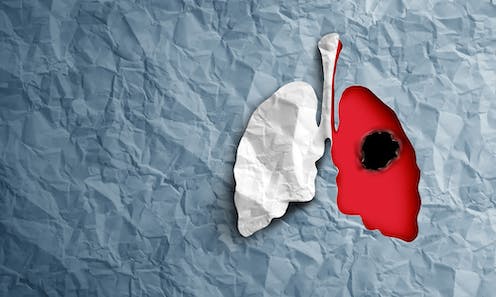
Lightspring/Shutterstock
Lung cancer is often caught too late. As a result, it has one of the lowest survival rates of all cancers. To detect it earlier, NHS England is rolling out a nationwide screening programme that has already begun in some areas, but will ramp up from 2025. Smokers and former smokers aged 55 to 74 will be invited to have their lungs scanned.
Table of Contents
Why do we need this programme?
Lung cancer kills more people than any other cancer: about 35,000 people a year in the UK. Without screening, it’s a difficult disease to diagnose early because people often don’t have any symptoms in the early stages of the disease and so don’t realise anything is wrong.
But with screening, lung cancer can be very treatable. Two large trials in the US and Europe found it significantly reduced the number of deaths from lung cancer.
In some areas of England, lung cancer screening is already being offered, and it is making a huge impact. Three-quarters of people in these areas who had lung cancer found by screening had it caught early.
How will people be screened?
People will be screened using a low-dose computerised tomography (CT) scan every two years. This is a type of CT scan that uses a lower dose of radiation than a regular CT scan. The amount of radiation is similar to the radiation we’re all naturally exposed to from the environment – such as building materials – over a year.
The scan, which uses X-rays, takes detailed pictures of the lungs. The person lies flat on a bed while the scanner circles their chest. It is quick and painless. Their head and legs stay outside of the scanner, so they don’t go into a tunnel, which some people worry about.
Who is eligible to be screened?
People aged 55 to 74 who smoke tobacco now or who have smoked in the past will be eligible for screening. They will be asked questions about how long they’ve smoked, and any personal or family history of lung diseases or cancer.
People at higher risk of lung cancer are more likely to benefit from screening by having lung cancer found early. But there are risks of screening as well as benefits, such as from the radiation (although the amount is small), diagnosing cancers that never end up causing the person harm (known as “overdiagnosis”), and being told you have cancer when you don’t.
Those who have a lower chance of getting lung cancer – because they are younger or have never smoked at all, or for as long – face the same risks of screening but are less likely to ever benefit, which is why screening is not offered to this group of people.
Of course, anyone can get lung cancer. It’s important for everyone, whether they’re being screened or not, to be aware of the symptoms and go to their GP if they have any concerns. Symptoms include a new cough that lasts longer than three weeks or a longstanding cough that gets worse, coughing up blood, tiredness, breathlessness and unexplained weight loss.
What happens if cancer is suspected?
Most people will get a screening result showing no signs of lung cancer. But if lung cancer is suspected, the person will be offered more imaging tests and potentially a biopsy to diagnose whether they have lung cancer.
About 15 out of every 100 people screened in UK studies had nodules found on their lungs. While some nodules need further tests for lung cancer (about four of every 100), smaller nodules (about 11 of every 100) are usually harmless and caused by something else like scarring from a previous chest infection.
But there is a small chance they could be very early lung cancer so these people are offered more low-dose CT scans to monitor if the nodule changes. Most of these nodules don’t cause a problem, but the screening programme keeps a close eye, just in case.
How many people will wrongly be told they might have lung cancer?
According to the information NHS England uses to invite people to lung screening, seven out of every 250 people screened will have further tests for lung cancer, such as a biopsy, when they do not have lung cancer.
How many people will be told they don’t have lung cancer when they do?
Like all screening programmes, sometimes screening does not find cancer when it is there. This is not very common in lung cancer screening, but we don’t have very reliable figures because it’s often not reported by trials.
How treatable is lung cancer if it’s caught early?
Very. An operation is often enough to completely remove the lung cancer or treatment with radiation that can destroy the cancer cells. Around 88% of people diagnosed with lung cancer at the earliest stage (stage one) survive for at least one year and 57% survive for at least five years.
However, just 19% of those diagnosed with the latest stage (stage four) survive for one year, and 3% to five years.
Is England the first country to roll out such a programme?
Lung cancer screening is already happening in several countries, including the US, Croatia, Poland and very soon, Australia. While lung cancer screening has been announced for England, we’re hopeful that similar announcements will be made for Northern Ireland, Scotland and Wales.
How many lives might it save?
The programme is expected to detect lung cancer in about 9,000 people every year, with most of them found to have early-stage disease – so a lot.
![]()
Samantha Quaife receives grant funding for her research from Cancer Research UK, Barts Charity, University College London Hospital Trust and Yorkshire Cancer Research.
























